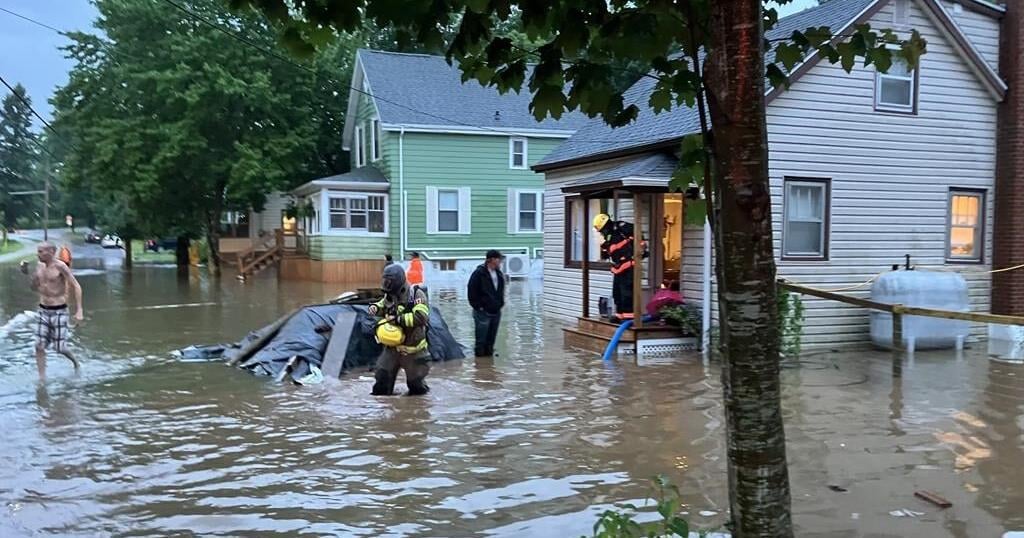FREDERICTON – Jennifer Moore was helping a neighbour on flood-prone Stannus Street, in Windsor, N.S., last week when she fell face first in waist-deep brown water in her driveway.
It was the third time in three years the catch basin on the street overflowed, after 1.2 metres of water adulterated with sewage poured into Moore’s basement on the road that runs through the Annapolis Valley town.
“It was terrifying,” she said Monday, as she prepared to rush out to get hepatitis and tetanus shots at a local clinic.
At times, she added, she isn’t sure if symptoms like headaches, nausea and diarrhea are simply part of a stress response or a physical condition caused by exposure to the latest climate disaster in her town.
However, psychologists say the distress faced by Moore and her neighbours is part of a worrying growth in mental health issues and trauma linked to the increasing incidents of flooding and other climate disasters occurring across the country. These experiences have been documented in studies over the past decade.
Three years after an August 2014 downpour in Burlington, Ont. — when 196 millimetres of rain fell in seven hours, flooding 3,500 homes — the Intact Centre on Climate Adaptation at the University of Waterloo released a psychological impact survey. Researchers found that 48 per cent of about 500 disaster victims said that following every major storm after that 2014 flood, their stress level was a 4.5 on a scale of 5, representing “maximum mental stress.”
Moore, who bought her Nova Scotia property in 2009, said that since 2021 she’s had to use her industrial-sized pump to flush out about 1.2 to 1.5 metres of sewage water from her basement on three occasions. “It’s very, very emotional” and “panic inducing” each time a weather alert calls for thunderstorms in the valley, she said.
“We have to start rearranging our day so that if (the street) does overflow, we can be home. We’ve cancelled vacations and trips because we can’t leave our homes unattended.”
At times, she simply internalizes her distress, making checklists of things she can do to keep her home as safe as possible.
Often, she feels “completely numb,” she said.
Stefania Maggi, a psychology professor at Carleton University, said an extreme weather event — such as a fire, flood and heat wave — can leave lasting emotional consequences.
“Often, there is this overwhelming feeling that climate change is so big and such a difficult challenge to overcome that we feel powerless,” she said in a recent interview.
Theodore Cosco, associate professor at Simon Fraser University’s gerontology department, said repeated exposure to extreme weather events could affect people in the immediate, short and long terms.
A short-term impact because of property damage, loss of life or home could cause post-traumatic stress disorder, while in the long term there may be generalized anxiety around the next potential climate disaster, he said.
“There’s this uncertainty, unpredictability, uncontrollability that is in the future.”
Depending on the age of the person and other pre-existing conditions, Maggi said it is possible that the anxiety and stress caused by climate change and weather-related events could lead to sleep disturbances, nervousness, and mood and appetite changes.
“These are all common responses to a traumatic experience, she said. “Typically, these are short-term effects that tend to resolve after several days or a few weeks, but occasionally, they will last for longer periods of time such as several weeks or months.”
Amanda Dunfield, who is Moore’s neighbour, said that in July 2023, after more than 250 millimetres of rain fell in the area, her family piled smaller pieces of furniture atop larger ones, tied up the drapes and evacuated. Last week, when more than 100 mm fell on Windsor, she once again was in response mode.
She has spent thousands of dollars upgrading her house since she bought it about three years ago, but the flooding continues. “I mean, it’s a house. It’s not a submarine,” she said.
For Dunfield, part of the distress is the sense that municipal and provincial political leaders aren’t moving quickly enough to repair and upgrade infrastructure — or provide reasonable offers to buy their homes. Meanwhile, moving isn’t an option due to the low prices offered for homes in her area.
The municipality of West Hants has said it’s studying how to separate the water systems in the area — to create one pipe for sanitary sewage and another for storm water. However, Mayor Abraham Zebian said in an interview last week, the engineering solution is complex.
“With a system as large and old as the one which handles the storm water in the core of Windsor, it’s not an overnight solution.”
Meanwhile, as officials try to find solutions, Dunfield said she and her neighbours struggle with a sense of loss — and growing frustration.
“I think grief certainly exists,” said Dunfield. “Sometimes it’s frank sorrow. I have had times when I just sit and sob for days when it’s all over and the adrenalin leaves, and you’re exhausted.”
This report by The Canadian Press was first published July 16, 2024.
